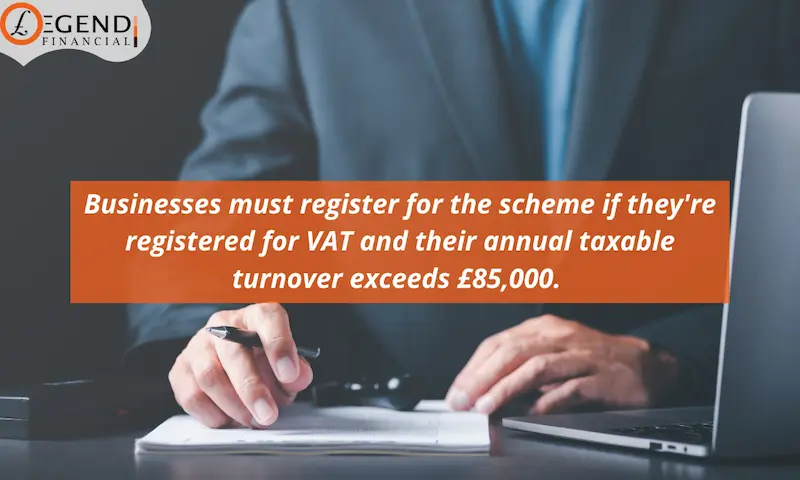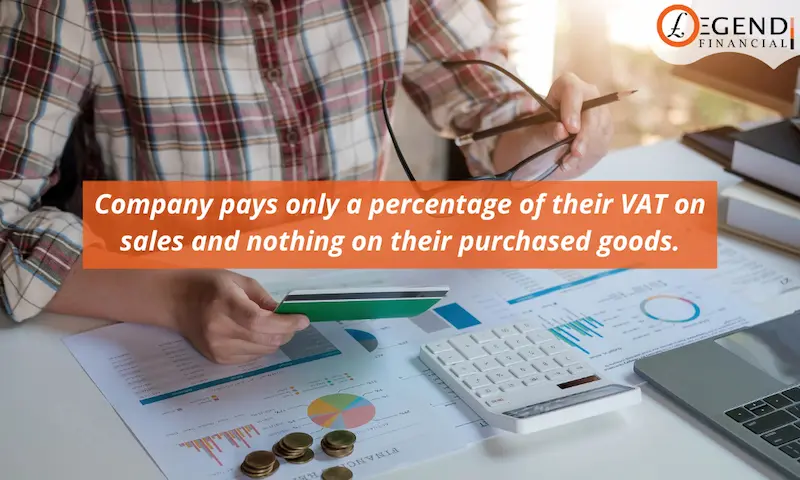Businesses in the UK have to deal with Value-Added Tax (VAT) whether they like it. The good news is that several VAT schemes are available, each designed to fit a particular type of business.
The standard VAT scheme is the first and most common type. It requires businesses to register with HMRC once their taxable income exceeds a threshold of £85,000 per annum. Companies registered under this scheme must pay VAT on all sales and reclaim the input tax from suppliers. This scheme works best for businesses that sell products or services with a high turnover rate.
Another type of VAT scheme is the Flat Rate Scheme (FRS). With this scheme, businesses pay a flat VAT rate on sales instead of charging and reclaiming input tax from suppliers. It benefits businesses that do not make large purchases or have low customer turnover.
The third type of VAT scheme is the Cash Accounting Scheme. With this, enterprises pay HMRC when they receive money from customers rather than when they issue invoices. It works best for businesses that take payment by cash or cheque and have a customer turnover of less than £1.3 million per annum.
This article has outlined some of the most common VAT schemes to help you make the best business decision.
Table of Contents
Reverse Charge VAT Scheme
VAT reverse charge is one of the many complex schemes for Value Added Tax (VAT). This scheme is known as ‘reverse charge, as it reverses the payment of VAT from the supplier to the customer. It requires businesses to act as tax collectors and remit VAT directly to HMRC instead of paying it to suppliers.

Businesses must register for the scheme if they’re registered for VAT and their annual taxable turnover exceeds £85,000. It applies to customers within the same country supplying services in the scope of VAT. In other words, any company providing a service to another business and charging them VAT must use this scheme.
The Reverse Charge VAT Scheme Applies to The Following Services:
- Construction and building services
- Telecommunications and broadcasting services
- Electrical, gas, heating, steam, and air conditioning services
- Transport of goods by road or water
- Hotel accommodation and similar services.
It’s important to note that Reverse Charge VAT does not apply to services from overseas suppliers or goods imported from abroad.
VAT Margin Scheme
Cash Accounting Schemes and Flat Rate Schemes are just a few of the Value Added Tax (VAT) schemes available. It may be overwhelming to work out which is right for your business, especially if you need to become an expert in taxation. The great news is that there are tools out there that can help simplify this decision-making process.
The Cash Accounting Scheme is an excellent option if you have a business that doesn’t collect a lot of money upfront. This scheme enables you to only pay VAT on the amount received by your business rather than the value of goods or services provided. On the other hand, if your customers pay up-front, the Flat Rate Scheme is more suited to your business.

The VAT Margin Scheme can also be helpful for businesses dealing in second-hand goods and collectors’ items. Under this scheme, you only pay VAT on the difference between your goods’ selling and purchase prices. It means you don’t have to get bothered about paying tax on the total value of each item sold.
Annual Accounting System
Flat rate schemes and cash accounting systems – VAT schemes can overwhelm businesses. Value-added tax (VAT) is not something most business owners want to invest their time in, but it does exist and must be dealt with accordingly.
If your taxable income exceeds £85,000 annually, you must register with the HMRC for VAT. And even if you make less than £55,000 annually, you can still register as a voluntary taxpayer. Once registered, it’s essential to understand the various VAT schemes available and how they might fit your business needs.
The Annual Accounting System is an ideal scheme for those who want to benefit from paying their VAT only once a year. Under this scheme, you’ll make estimated payments on the 20th of each month and submit a final payment at the end of the year to cover any gap between your estimated costs and what is due.
If you have consistent income patterns throughout the year, the Flat Rate Scheme is suitable. This scheme is straightforward and will require you to pay a flat rate of VAT on your taxable sales, with the amount varying depending on your business sector.
The Cash Accounting System allows businesses to account for their VAT based on when payments are received from customers rather than when invoices are issued. This scheme can be beneficial for companies whose income varies each month.
Limited Cost Trader Schemes
Value Added Tax (VAT) is an unavoidable part of business in the UK, but understanding how to make it work for you can take time and effort. Based on the length of your business and other factors, like whether you’re registered for VAT or a voluntary taxpayer, different schemes are available to help ensure you stay compliant with tax regulations.
The Limited Cost Trader scheme is designed specifically for businesses whose yearly expenditure on goods used exclusively for business activities is below a certain threshold. Under this scheme, the company pays only a percentage of their VAT on sales and nothing on their purchased goods.

The Cash Accounting scheme is ideal for sole traders and smaller businesses who find it challenging to keep up with the administrative burdens of recording invoices. With this scheme, you pay VAT on money received rather than when invoices are issued.
Finally, if your business turnover exceeds £1.35 million, you may grab the advantage of the Annual Accounting scheme. This scheme simplifies the administrative burden of VAT by reducing the number of returns you submit and allows you to pay a set amount quarterly or annually.
Final Thought
Depending on your taxable income, customer turnover rate, and type of sales, one of these VAT schemes may be the perfect fit for your business. Speak to an accountant or tax advisor if you need further clarification before registering with HMRC. Learning is always possible, so take advantage of the benefits of understanding VAT schemes.
If you want a clearer understanding of which scheme is right for your business you can contact Legend Financial team. Our experts are always happy to discuss different VAT schemes. Contact us today to learn more about the range of VAT schemes available and how they could help you save time and money.
























































































































































































































































































































































































































































































































































































































































































































































































































































































































































































































































































































































































0